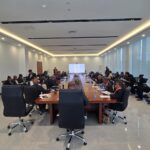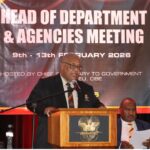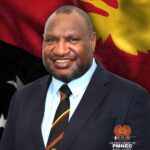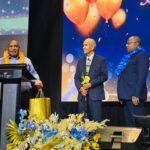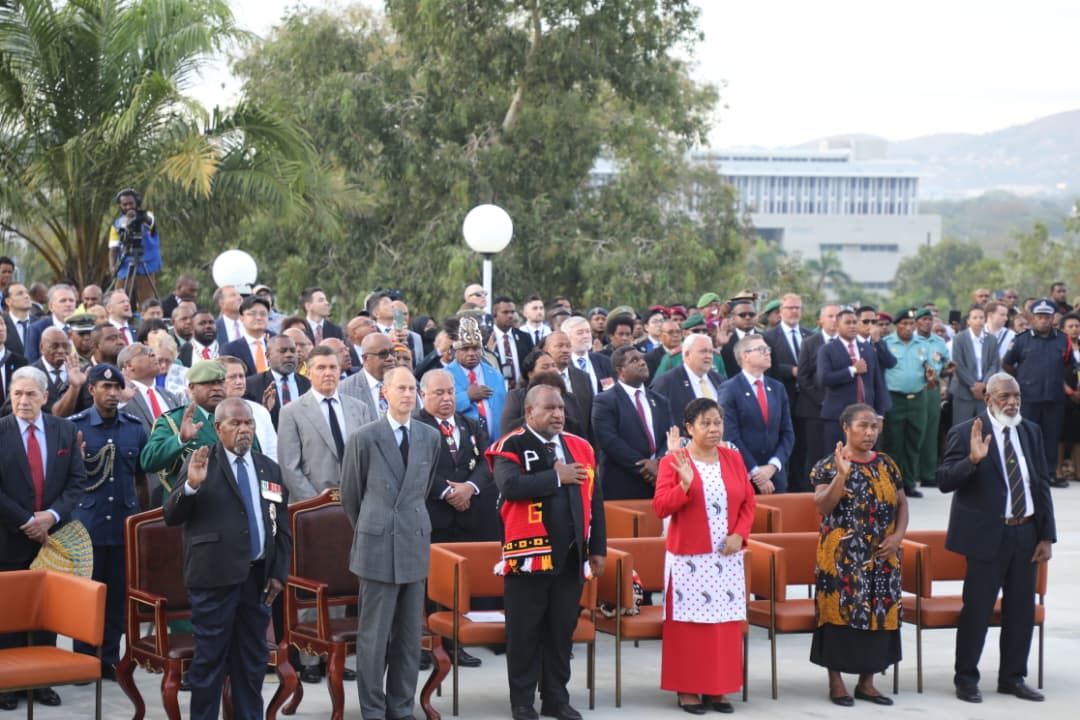Papua New Guinea today marked 50 years of nationhood with the raising of its national flag at Independence Hill, Waigani.
In his Golden Jubilee Address, Prime Minister Hon. James Marape reflected on the country’s economic journey since 1975, highlighting achievements, challenges, and a vision for inclusive prosperity in the decades to come.
“From many, we became one,” the Prime Minister told thousands gathered at dawn. “And 50 years on, we stand on firmer ground, more confident, more stable, and ready to transform our economy for the next generation.”
From Villages to a Growing Economy
At Independence in 1975, Papua New Guinea was a rural nation of around 2.8 million people. Its economy was valued at just US$1.36 billion, with most citizens engaged in subsistence agriculture. Half a century later, the population has grown nearly fourfold to 10.7 million, while the economy has expanded more than 20 times, now worth US$32–33 billion.
Average incomes have risen too. In 1975, GDP per capita was around US$480. Today it stands at roughly US$3,000. “Yes, while we have not achieved all that we could, the foundations are there,” Marape said. “We have sent more children to school, built more hospitals and roads, and seen Papua New Guineans excel in professions unthinkable 50 years ago.”
Gains in Human Development
The Prime Minister also noted improvements in health and education. Life expectancy has increased from under 50 years in 1975 to around 66 years today, and Papua New Guinea has achieved a Human Development Index score of 0.576, placing it in the “medium human development” category. “This is evidence that we are not standing still. We are moving forward,” he said.
The urban population has grown past 1.4 million, yet over 80 percent of citizens still live in rural areas. The Prime Minister stressed that development must reach every community: “Connectivity by roads, ICT, and energy must not belong only to Port Moresby. It must reach every valley, village, and island of our country.”
Uneven Growth and Ongoing Challenges
Despite progress, Prime Minister Marape acknowledged deep inequalities. “We still have many pockets of poverty, many young people without jobs, and corruption robs us of resources meant for our people,” he admitted.
Much of the country’s economic growth has been driven by resource projects in minerals, oil, and gas, but the benefits have not been evenly shared. “Our challenge now is to translate resource wealth into real services, opportunities, and prosperity for every Papua New Guinean,” the Prime Minister said.
Vision for the Next 50 Years
Looking to the future, Marape outlined a blueprint to transform PNG’s economy into one that is inclusive and sustainable. Central to his vision is moving one million families from subsistence to commercial agriculture within the next decade.
“Our people own land, and land is wealth,” he said. “If we can bring one million families into commercial farming, we will unlock an agricultural revolution and ensure our people share in the wealth of our nation.”
He also pledged investment in infrastructure, renewable energy, ICT, and a merit-based society. “Efficiency in our public service through digital tools must eliminate corruption and nepotism,” he said. “We must build a society where opportunities are earned on merit, not privilege.”
The Prime Minister underscored that democracy remains PNG’s greatest achievement. “In the last 50 years, many nations faltered, but we preserved our democracy. This is our biggest achievement.
For the next 50 years, we must defend it at all costs.”
A Personal Reflection
Marape closed with a deeply personal story of his own journey, recalling how he stood barefoot as a boy in Nomad River (Western Province) watching the flag raised for the first time in 1975. “Who would have thought that a child from the remotest part of our land could one day stand here as Prime Minister? If I could, then millions of Papua New Guineans who feel they are the least and the last must know that this day belongs to you.”
He called on all citizens to join hands for the nation’s next chapter: “The next 50 years must be about nation-building, renewal, and transformation. No one must be left behind. From many, we became one – and together, we will rise again.”


